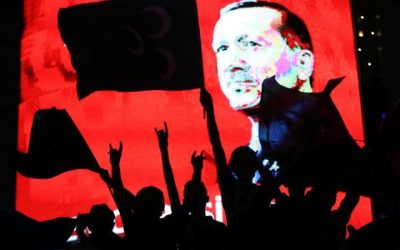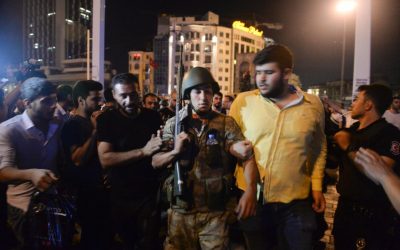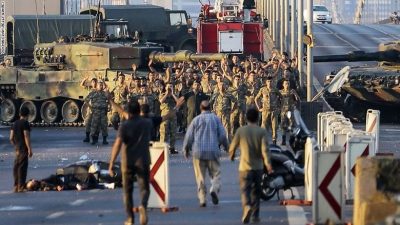AFP photo
By
Grégory Wilson
On July 15, President Recep Tayyip Erdogan became the first president in Turkey’s modern history to still be in power after a military coup.
It is widely believed that the coup failed when Erdogan’s supporters took to the streets, defying the Army’s takeover.
Henri Habib is the Distinguished Professor Emeritus at Concordia University. He also served for 24 years as the university’s Chair of the Political Science Department.
According to him, Mr. Erdogan felt “vindicated, [in that] he asked the people to come out in the streets and they did.”
The president summarily retaliated.
“This uprising is a gift from God to us because this will be a reason to cleanse our army,” Erdogan said to a large crowd of supporters the night of the coup [1].
Indeed, he did not waste time in purging the army. In the following hours and days, thousands of soldiers were arrested.
AP photo
On July 20, Turkey had formally charged 99 generals and admirals in connection with the failed putsch. They represent just under a third of the country’s 356 top military officials.
Despite this widespread crackdown on the armed forces, Erdogan still invoked a state of emergency, five days after the coup.
According to Dr. Habib, he did so “because he is both cautious and afraid of the Army. He is a skillful strategist and a person in his position cannot ignore the Army, especially considering the long history of coups in Turkey.”
Photo – Gokhan Tan
On July 21, Erdogan told Reuters the military will swiftly be restructured.
Yet, President Erdogan did not simply go after soldiers he suspected to be involved in the coup.
As was reported in the days following the coup, he also went after members of the judiciary and education sectors, civil servants, religious teachers and figures and police officers.
Erdogan declared his objective was to “cleanse all state institutions” of the “parallel state” put in place by his arch-rival, Fethullah Gulen, whom he accuses of orchestrating the coup [2].
According to the president, members of Gulen’s movement have infiltrated every aspect of Turkish society and must be weeded out. Mr. Gulen is in self-imposed exile in the US.
In total, more than 60,000 people have been affected by Erdogan’s purges.
Dr. Habib believes this is a first step towards the president’s long-term goal.
“He is a man of great ambition. The feeling of his neighbours is that he wants to re-establish the Ottoman Empire, but that he must first consolidate his power in Turkey,” he said.
Turkey was once the head of the Ottoman Empire, a multinational empire that, at its height, spanned from southeastern Europe to parts of North Africa. It was defeated by the Allies during World War I. They then occupied and partitioned it until the Turkish War of Independence.
In 1923, Turkey won its independence under the leadership of Mustafa Kemal Ataturk. The latter then became the modern, secular, republic’s first president.
For a time, Turkey remained secular due in part to the Turkish military’s political power.
“The Army considers itself as the custodians of Ataturk’s tradition. Whenever parties misbehaved, they would intervene [with a military coup],” said Dr. Habib.
In fact, the armed forces intervened on four occasions, namely in 1960, 1971, 1980 and 1997.
Notably, the 1997 coup pushed then Turkish Prime Minister Erbakan out of office and disbanded his Islamic Welfare Party. At the time, Erdogan was a junior member of that party.
Yet, last week the Army faltered in the face of Erdogan’s public support.
“The majority of the people, the masses, back him. The educated are terrified of his authoritarian tendencies. It’s a cleavage between urban and rural, between Islamists and [religious] secularists,” said Dr. Habib.
The number of people targeted in these purges suggests it was a plan already in motion.
According to Dr. Habib, President Erdogan is slowly pushing for the return of an openly Islamic government. As such, he does not trust the more highly educated, secular-minded, civil servants.
“Most of the civil servants are liberal-inclined. [Moreover], most of [them] had been appointed before Erdogan rose to power in 2002, under secularist parties,” he said.
Reuters photo/Umit Bektas
Dr. Habib is not alone in thinking that President Erdogan is clamping down on his critics in the name of going after members of Gulen’s movement.
Reva Goujon is the VP of Global Analysis at Stratfor, a US-based global intelligence company.
She states that Erdogan is using this coup “to net dissenters of all types.”
According to her, it will also serve “to accelerate his plans to reform the constitution in the name of ridding Turkey of its coup-ridden past. This in turn, will enable him to augment the powers of the presidency and expand his avenues for clamping down on dissent.”[3].
Metin Feyzioglu, the chairman of the Turkish Bar Association, also expressed his concern about the future of Turkey, under a government intent on continuing its crackdown.
“They [the authorities] must understand that if they want to follow the way that leads to eliminating all their critics, then there will be no country to govern, no society to lead, and unfortunately the country will disintegrate,” he said, according to a BBC report [4].
These widespread purges and the post-coup human rights issues have raised worries among members of the international community, including Canadian Prime Minister Justin Trudeau.
“Coups d’états are never a good thing. But at the same time, we are concerned that the democratic institutions, Turkey’s constitution, are respected; that the rule of law continues,” Trudeau said during a press conference [5].
Dr. Habib considers that Western countries will try to use diplomacy to steer Erdogan away from his chosen path, and relations between them and Turkey will be strained as a result.
Yet, whatever the outcome of those talks, with wars raging against ISIS and Assad’s forces in Syria, as well as the subsequent refugee crisis, “the West realizes it needs Turkey”, concludes Dr. Habib.





It is time to slow down and take a break to analyse the situation and go forward